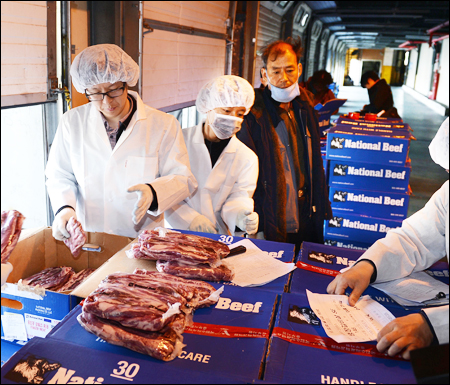‘Korea, US cut secret beef deal’

Officials from the Ministry for Food, Agriculture, Forestry and Fisheries inspect U.S. beef at a cold storage warehouse in Gonjiam, Gyeonggi Province, Thursday, following a recent report of the first case of mad cow disease in the United States in five years.
Lawmaker claims gov’t complied with US demand for softer stance

An opposition lawmaker alleged Thursday that the government promised the United States not to discontinue American beef imports even if a new case of mad cow disease was reported in a secret deal made in 2008.
Rep. Park Joo-sun of the main opposition Democratic United Party (DUP) displayed a copy of a document that Deputy Trade Minister Choi Seok-young sent back home, inquiring how he should respond to a statement by his U.S. counterpart Wendy Cutler.
The document with the serial number “s6929” and written on May 9, 2008, according to Park, included Cutler’s wish to see Korea soften its stance and stop short of slapping a ban on U.S. beef imports if a new case of bovine spongiform encephalopathy (BSE), colloquially mad cow disease, was reported. It was sent around the time Korea resumed imports.
Park says the document showed Cutler took issue with newspaper advertisements of the Ministry of Food, Agriculture, Forestry and Fisheries (MIFAFF) printed on May 8, 2008 when the two met.
“Back then, the prime minister’s office promised that Korea would stop imports of U.S. beef if mad cow disease recurred there and posed a health threat to our people,’’ Park said.
“In comparison, MIFAFF pledged to immediately halt imports of U.S. beef as soon as mad cow disease was detected. Cutler was against this and asked Seoul to make its stance clear.’’
He alleged that the Lee Myung-bak administration may have promised not to stop the shipment of U.S. beef.
“We will ask how the incumbent administration replied to Cutler. We suspect that it agreed with the U.S. Then, it might face a huge backlash from the public,’’ Park said.
Earlier this week, the U.S. confirmed its fourth case ever of BSE for the first time in some eight years. It said that a diary cow in central California suffered from the lethal illness.
However, MIFAFF said that it would not stop quarantine inspections of U.S. beef because there was no threat to people’s health.
The disease was found in a cow older than 30 months, the meat of which is not imported to the country. Instead, it intensified the inspection by checking 10 percent of U.S. beef, up from the previous norm of 3 percent.
Cheong Wa Dae also came up with a similar response _ “In 2008, the Prime Minister’s Office said that it would stop imports of U.S. beef if mad cow disease occurs in the U.S. and becomes a health threat to the people,’’ presidential spokesman Park Jung-ha said.
He added that even though the BSE was found in the U.S., it was unlikely to pose a health threat to Koreans; hence, the country need not halt beef imports
“In 2008, MIFAFF said that it would instantly halt imports of U.S. beef and checking all products here should mad cow disease happen in the United States,’’ Park Joo-sun said.
“However, the ministry is not complying with its own words. Maybe, it does not have the right to do so after promising not to. I will check how the government responded to the U.S. request.’’
When contacted, Depute Trade Minister Choi refused to comment. He did not rebuff the details of the document saying he could not remember the meeting.
BSE is a lethal disease in cattle that can trigger human variant Creutzfeldt-Jakob Disease (vCJD), a fatal human brain disorder.
vCJD was first detected in 1995 in the United Kingdom and has claimed many lives worldwide. Korean people’s worries about U.S. beef were mostly over the concerns about contracting vCJD.
The imports of U.S. beef products were prohibited by the Seoul administration in the early and mid 2000s after a BSE case was reported there.
After a years-long ban, Korea resumed imports of U.S. beef in 2008 in the hope of obtaining U.S. congressional approval for a free trade agreement between the two allies. <Korea Times/Kim Tae-gyu>

























































